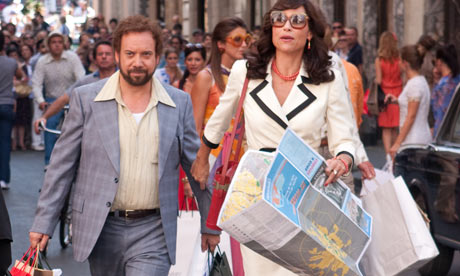Esi Edugyan was raised in Calgary and lives in Victoria, British Columbia. Her debut novel, The Second Life of Samuel Tyne, was published in 2004. Her second, Half-Blood Blues, was serialised last month as BBC Radio 4's Book at Bedtime.
Buy Half Blood Blues at the Guardian bookshop
"It's a complicated affair, the attraction the New World feels for the Old. Europe's been many things to Americans, over the shared span of their histories – a seat of both liberty and oppression, power and corruption, of art, literature, even language itself. By the dawn of the 20th century, Europe's liberties were the liberties denied so many Americans, whether racial, sexual, or gender-specific. It doesn't matter how much of it was true – for so many artists, Europe came to stand for all that was bohemian. You only needed to board a boat in order to live a freer life. This is the case in Half-Blood Blues, where jazz musicians in the 1920s travel to Berlin to ply their trade in the cabarets.
"The books listed below wrestle with this complicated vision of Europe – sometimes failing to find it, sometimes finding it altered, or not as sweet as it was said to be, and sometimes (sadly) discovering Europe was less a place than a moment in time. Not all of these books are, strictly speaking, 'expat' works. But each reckons with the complicated inheritance North Americans have had to come to terms with, and still do, when understanding their place in the world: with that dazzling, elusive, imaginary place called Europe."
1. Barney's Version by Mordecai Richler
Best read with a vintage scotch and a fine Cohiba in hand. Scrappy, savagely witty, this is written as the memoirs of one Barney Panofsky, a boozy television producer trying to defend himself from accusations of murder. Although a good deal of the novel is set in Montreal, the funniest scenes take place in Paris, where Barney's band of louche, wannabe writers bum around hoping to become the next Hemingways and Fitzgeralds. As painfully moving as it is hilarious.
2. A Sport and a Pastime by James Salter
Ah, beautiful young people having sex in the French provinces. Voyeurism doesn't get much better than this. Neither does prose. A sad, exquisitely vivid dream.
3. The Portrait of a Lady by Henry James
Isabel Archer is easily one of the most attractive heroines in all of western literature, right up there with Austen's spitfires. Her journey from self-expression to self-deception, from wide-eyed American waif to the wife of a cruel boor, is excruciating to behold.
4. The Dean's December by Saul Bellow
This one goes against the grain: here Europe isn't a romanticised seat of ancient culture, but a bleak place to escape some bleaker American problems. Corde, the dean of a Chicago college, travels with his wife to Bucharest to see his dying mother-in-law. Having made himself a target of hate for some influential people back in Chicago, and having also ended up at the centre of a controversial trial in which two blacks are accused of killing a white student, Corde has much to hide from. But communist Romania's decay and corruption only highlight all he's tried to leave behind, and he comes to realise Europe is no exit at all.
5. The Innocents Abroad by Mark Twain
Based on his newspaper serial about his steamship voyage in 1867 to Europe and the Middle East, Innocents Abroad abounds with Twain's characteristic wit. From Paris to Genoa to Rome, we're treated to stories of Twain's hapless fellow travellers, and of irritating tour guides whose sameness blurs them into one entity called "Ferguson". As fresh today as when it was written.
6. A Moveable Feast by Ernest Hemingway
This one goes without saying. There is no better window into the artistic life of 1920s Paris than this slim volume from one of that century's greatest writers. All of the legends are here: Gertrude Stein; Ezra Pound; Scott and Zelda Fitzgerald; James Joyce. The original, effortless portrait of the age.
7. The Great Fires: Poems 1982-1992 by Jack Gilbert
One of America's greatest living poets, Gilbert won a Guggenheim as a young man to travel to Europe, and ended up living on a Greek island for almost two decades. The Great Fires is his deepest book, the one in which his themes of love and exile are most purely distilled, most brilliantly crystallised. The verse is lucid and intimate without being confessional. A poet who dazzles even those who say they hate poetry.
8. Memoirs of Montparnasse by John Glassco
In 1927, numbed by a deadening semester at McGill University and fuelled by a desire to write poetry, John Glassco fled Montreal for the wilder shores of Paris. While perhaps not the most truthful depiction of these rollicking years, it's definitely one of the most lively and entertaining. A classic.
9. Giovanni's Room by James Baldwin
Daring in its time for its candour about homosexuality, Giovanni's Room is the beautifully written tale of David, an American, struggling to come to terms with his desires in 1950s Paris. Engaged to an American woman – an arrangement that would allow him to lead a socially acceptable life – he is besotted with the young Italian Giovanni. The inner conflict goes beyond sexuality to the very core of his identity.
10. The Collected Stories of Mavis Gallant
Alongside Alice Munro, Mavis Gallant is without argument one of the greatest short-story writers alive. While Munro's purview is mainly the lives of women in rural Ontario, Gallant – who moved to Paris to write full-time in the 50s – writes of Europeans, and of Canadians abroad in Europe, in some of the most piercing and clear-eyed prose you will ever read.









